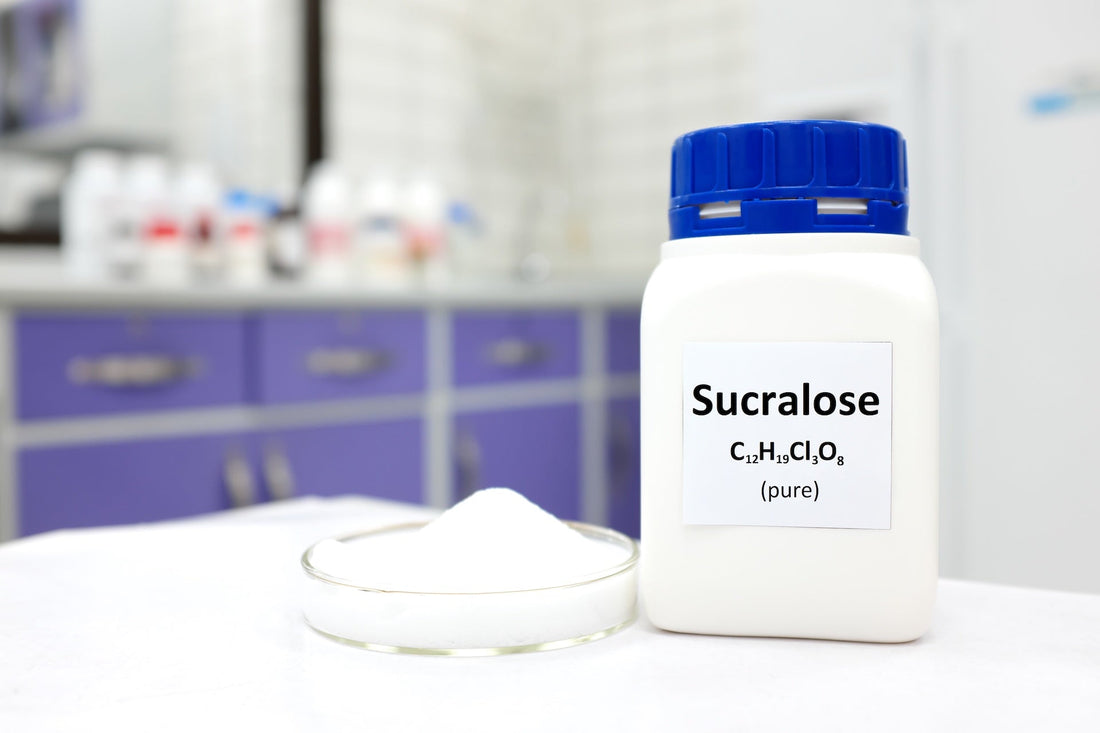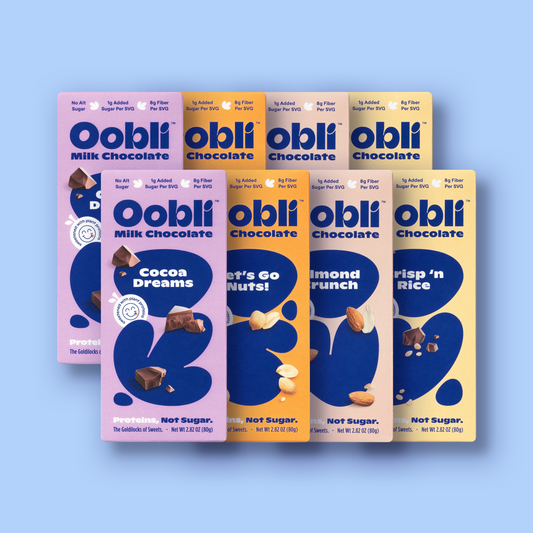Have you ever experienced an unexpected reaction after enjoying a diet soda or a sugar-free treat and wondered why? You might be among the few who face a lesser-known yet impactful issue: an allergy to sucralose (commonly sold as Splenda).
Wait, can you be allergic to sucralose? Unfortunately, yes - and it’s more common than you may think. This artificial sweetener is found in countless low-calorie products. It can be a hidden trigger for uncomfortable, even alarming, symptoms.
From pinpointing the telltale sucralose allergy symptoms to navigating the path towards a professional diagnosis, we’ll cover everything you need to know in this guide. We’ve also got you covered with safe and satisfying alternatives.
An Overview of Sucralose
Sucralose is a zero-calorie artificial sweetener used globally. It’s synonymous with sugar-free sweetness and is found in everything from sugar free drinks to snacks.
It was discovered in 1976, born out of a collaborative research project between Tate & Lyle and Queen Elizabeth College in London. It's a derivative of sucrose where three hydroxyl groups are replaced with chlorine atoms, a modification that makes it non-metabolizable by the human body.
After extensive testing, sucralose was approved for use in foods and beverages by the U.S. Food and Drug Administration (FDA) in 1998. Since then, its popularity has skyrocketed, leading to its presence in thousands of products worldwide.
Sucralose is unique in that it's about 600 times sweeter than sugar but doesn't carry the same caloric load. This is due to its chemical structure, which prevents it from being broken down for energy in the human body.
One of the reasons for sucralose's popularity in the food industry is its stability under heat and over a broad range of pH conditions. This makes it a versatile choice for various food products, including baked goods, beverages, and confectioneries.
While providing a sweetness similar to sugar, some consumers report a different aftertaste, which can vary from person to person. This is similar to the nasty stevia aftertaste many individuals report.
That being said, you came here to learn about allergic reactions to sucralose. So, what is sucralose allergy - and is this what’s been giving you grief?
What is Sucralose Allergy?
An allergy to sucralose is a significant concern for those who experience it. An allergic reaction to sucralose occurs when the immune system mistakenly identifies sucralose as a harmful substance and triggers a defensive response.
Can You Be Allergic to Sucralose?
Unfortunately, yes - sucralose intolerance is all too common. After all, this is an artificial sweetener. It’s made in a lab rather than coming from this earth. As such, it should come as no surprise that your body has trouble digesting it properly and shows adverse reactions.
While food allergies are common, specific allergies to artificial sweeteners like sucralose are less frequent. However, awareness is key for those who may be sensitive. That being said, what are the sucralose allergy symptoms you should watch out for?
What are the Sucralose Allergy Symptoms?
There are immediate reactions to consuming sucralose that indicate an allergy. These can include skin reactions such as hives, itching, or eczema.
Some individuals may experience gastrointestinal symptoms like nausea, abdominal pain, or diarrhea. Others may experience a sucralose headache.
In some cases, sucralose can trigger respiratory symptoms, including coughing, wheezing, or shortness of breath. In very rare instances, sucralose can cause a severe allergic reaction known as anaphylaxis, which requires immediate medical attention.
Long-Term Effects of Allergy to Sucralose
While the initial symptoms are problematic as is, it gets worse for those who are allergic and continue to use the artificial sweetener long term. Repeated exposure to sucralose for allergic individuals can lead to chronic issues like persistent digestive discomfort or recurring skin rashes.
The need to vigilantly avoid sucralose can affect dietary choices and quality of life, especially given its prevalence in many processed foods and beverages. This is why we recommend getting a professional diagnosis.
Getting a Professional Diagnosis
If you suspect a sucralose allergy, it’s important to consult with an allergist or a healthcare provider. They can provide a detailed evaluation and may recommend an allergy test.
This might involve skin prick tests or blood tests to determine if your body is producing antibodies against sucralose.
In some cases, a healthcare provider may suggest an elimination diet, followed by a controlled reintroduction of sucralose, to observe for any reaction. We’ll offer tips on getting started below.
If You’re Allergic to Sucralose, Here are Some Tips on Staying Safe and Finding an Alternative
Navigating a diet with an allergy to sucralose can be challenging, especially given its prevalence in many products. However, with careful planning and knowledge, you can avoid sucralose and still enjoy a variety of delicious and sweet foods.
Reading Labels: How to Spot Sucralose in Ingredients
If you discover you’re allergic to sucralose, you’ll need to be way more diligent in reading labels. While commonly found in diet sodas and sugar-free desserts, sucralose can also be present in less obvious products like sauces, dressings, and bread. Read labels diligently.
Sucralose is often listed under its generic name but can also be found under brand names like Splenda. Familiarize yourself with these terms to identify it quickly on ingredient lists.
In some regions, labels might not explicitly list sucralose. Understanding local food labeling laws can help in identifying hidden sucralose.
Exploring the World of Sugar Alcohols and Other Substitutes
As you look for alternatives to sucralose, you may enter the world of sugar alcohols. These include xylitol, erythritol, and sorbitol.
They are lower in calories compared to sugar and do not cause a spike in blood sugar levels. Sugar alcohols generally have a lower glycemic index and are tooth-friendly, too. They are often used in chewing gums, toothpaste, and sugar-free candies.
That being said, sugar alcohols can cause digestive issues, especially when consumed in large quantities. It’s important to introduce them gradually into your diet. Learn more about the side effects of erythritol in our blog to see why more and more individuals are looking for an erythritol substitute. The most important resource to read is: does erythritol affect kidneys?
Natural Sweeteners as Alternatives: Pros and Cons
There are many other natural sweeteners you can look to in favor of sucralose. Stevia is perhaps the most popular. Derived from the leaves of the Stevia plant, it is much sweeter than sugar and has no calories. It’s a popular choice for those looking to reduce their sugar intake.
That being said, some people may find its taste slightly bitter or licorice-like. There is also a reason why stevia was banned. We’ve written extensively about the risks of stevia while pregnant, how much stevia is too much, splenda vs stevia, and more.
Honey and maple syrup are natural and minimally processed sweeteners you can try as well. These are less questionable and contain antioxidants and nutrients not found in refined sugar. However, they are still high in calories and can affect blood sugar levels.
The best natural sweetener, though, is sweet protein. These are derived from exotic fruits and provide a pure and satisfying sweetness, making them an ideal choice for health-conscious consumers.
Not only are they the healthiest choice, they’re the best-tasting choice. And delicious snacks and drinks powered by this natural goodness are just a few clicks away…
Get Sucralose-Free Drinks and Snacks at Oobli!
Those looking for safe, delicious alternatives free from sucralose can trust in Oobli. We offer a range of products that cater to your needs. Our drinks and snacks are not only free from sucralose but also from other artificial sweeteners, ensuring you can enjoy them without worry.
So, how are they so sweet? As mentioned earlier, we harness the power of sweet proteins in our chocolates and sweet teas. These natural, groundbreaking ingredients offer a superior taste without the drawbacks of traditional sweeteners.
We encourage you to learn more about our sugar free drinks and chocolate today and see why they’re quickly finding their way into pantries and fridges around the world. They’re a must-have in your healthy snacking arsenal, whether you have a sucralose allergy or not!
Parting Thoughts on Sucralose Allergy Symptoms
In navigating the challenges of sucralose allergies, from identifying symptoms to addressing daily frustrations, the journey towards a healthier lifestyle becomes crucial.
Remember, you don’t have to compromise on taste for well-being. At Oobli, we offer an easier, worry-free choice with our range of products free from sucralose and other artificial sweeteners.
You can learn more about the problems with artificial sweeteners in our blog. We have resources on sucralose vs aspartame, is sucralose bad for your gut, can you have sucralose on keto, is sucralose bad for teeth, aspartame withdrawal, aspartame headache relief, aspartame and inflammation, and more.
At this point, though, it’s time to treat yourself to a delicious, health-conscious alternative at Oobli.
We have drinks without aspartame, sucralose, or any other problematic artificial sweeteners. The sweet iced tea we’ve formulated at Oobli is not only better for you, but it tastes amazing! The same is true of our Oobli chocolate for those who have a serious sweet tooth but don’t want to compromise on health.
Embrace the joy of natural sweetness and explore our collection today, where your health and satisfaction are our top priorities!




